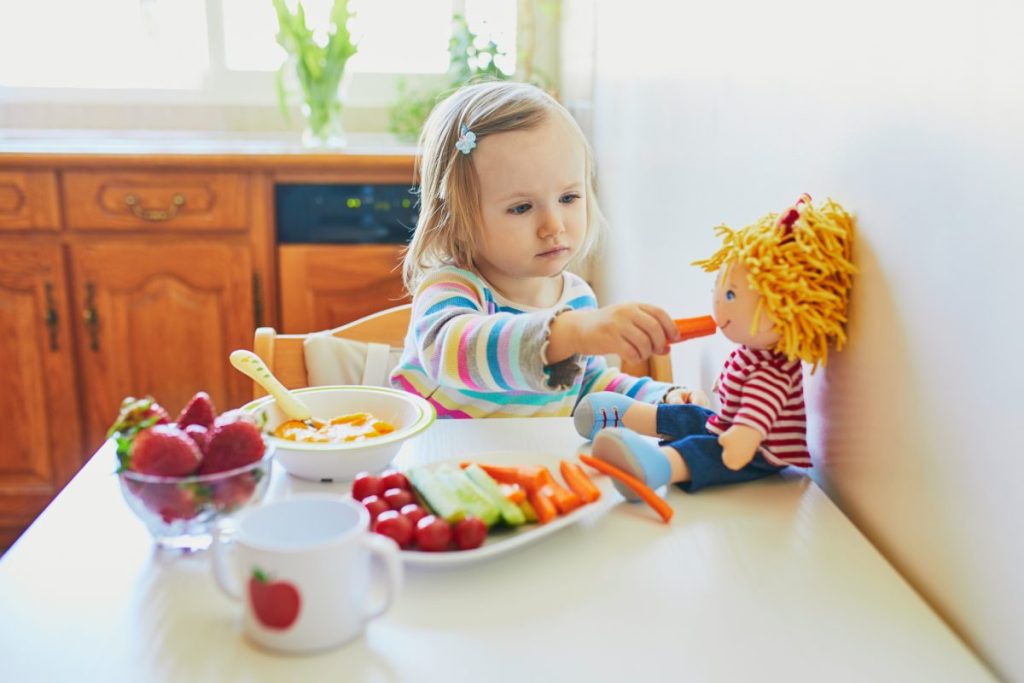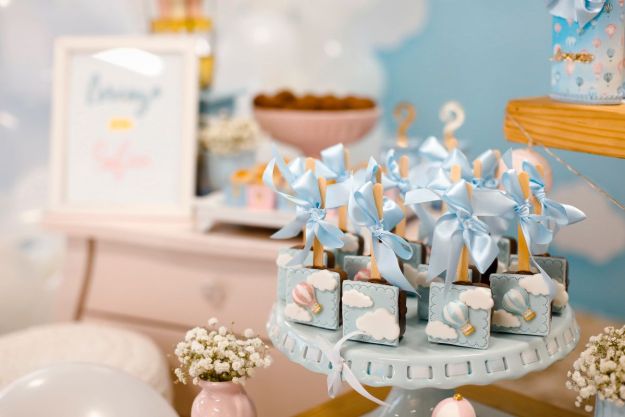Toddlers do all kinds of things that make parents question their sanity. One fun thing that toddlers do is play with the food you prepared for them. But is it a normal toddler learning experience or something else? If your toddler plays with food, the question is — should you let them?
The answer is yes — for the most part. While you may think it’s bad manners or that it encourages your child to misbehave, your toddler playing with food has many benefits for them. As long as you keep it within reason, it’s just fine to embrace the mess. Here are some reasons why you should let children play with food and a few tips on how to set boundaries.

It helps exercise fine motor skills
It’s a sensorial experience
Meals are a delicious experience that awaken all the senses. Just like you as an adult, your child delights in the aromas, colors, textures, crunch, and tastes of their food. Let the wonder take over your toddler as they explore the food around them. As part of the exploration, they’ll eventually put the food in their mouth. Hopefully.
Rather than inhibiting their sense of adventure, get your camera ready for the moment when the flavors explode in your child’s mouth. The look in their eyes will be priceless.
These are some great finger foods that your toddler will enjoy:
- Avocado
- Crackers
- Cheese sticks
- Meatballs
- Boiled eggs
- Diced fruit
Finger foods are a wonderful way to help your toddler develop their fine motor skills. These fun meals have countless benefits for your little one’s oral motor progress and even help develop speech.

It boosts independence
Children learn by touch and play, and crossing that over to food is no exception to this rule. When you let your child experiment with their food, you’re actually teaching them to feed themselves. This encourages your toddler’s independence and boosts their self-esteem.
Whether they use their fingers to pick up peas or a spoon to eat yogurt, watching your child try to eat on their own is an adorable experience. Resist the urge to rush or clean them up. Instead, sit back and motivate them to keep trying. Let them know how proud you are because this is a big milestone that deserves celebration.
It encourages them to try new foods
When your child pulls apart, smells, or inspects their food, it’s not because they’re being picky. In fact, it’s the opposite. You smell your favorite dish or use your fork to pick apart a food that you haven’t yet tried before you taste it. The same goes for your toddler.
By playing with their meals, young kids get to know new foods and are more likely to try them. The more varied your meals, the more they’ll get their hands dirty to explore them. Take this experimentation as a sign that you’re doing a good job as a parent. And before you know it, your child will be eating a whole rainbow of fresh foods.
It also gives parents a bit of a break
Are you tired of having to feed your child first and then you get to eat a cold meal? Hungry parents are as cranky as babies when they are “angry.” We all become the same when it comes to an empty belly.
Use this opportunity to model good eating habits and enjoy family meals. This is the beginning of a new stage in your child’s life. It’s also a chance for you to bond with your little one and introduce them to new flavors. Plus, if they become more confident in feeding themselves, you could sneak in a hot bite here and there while they are busy.

How to avoid too much mess
Of course, there’s such a thing as taking things too far. There’s a fine line between letting your child experiment with food and enabling poor table manners.
Here are some ways to keep it polite, age appropriate, and fun for all:
- Don’t let mealtime turn into playtime. If your child starts tossing their food, remove the plate and let them play with toys. When they’re hungry again, offer the same meal.
- Only feed your child when they’re hungry. Otherwise, they’ll end up playing out of boredom and won’t eat anything.
- Keep portions small so there’s less food to smush.
- When you have company, serve your toddler foods that create less of a mess.
- Place a towel, blanket, or mat around your child’s highchair. Most of the mess will land there and cleanup will be much easier. Or have the family pet at the ready.
- Remind your child to say “please” and “thank you” as a way to encourage positive table manners.
Next time your toddler gets as much food in their hands as their mouths, take a deep breath and let them play. This learning experience is more valuable and fun than you remember it being. As long as you’re supervising and making sure that they stay within limits, playing with their meals is a toddler milestone. It helps your child develop new skills and a love for healthy foods.
Kids are only little once. Let them have their cake, and play with it, too. Cleanup time may be a bit longer for you, but you’re creating great memories for your little one while helping them develop some big kid skills.
Editors' Recommendations
- Is your kid screaming for no reason? Here are ways to deal with a screaming child’s behavior
- How much water should a 1-year-old drink? What you need to know
- What is nesting? Everything you need to know about this totally normal behavior
- When can babies eat baby food? This is when to make the switch
- How old do you have to be to fly alone? Read this before booking your kid’s trip


